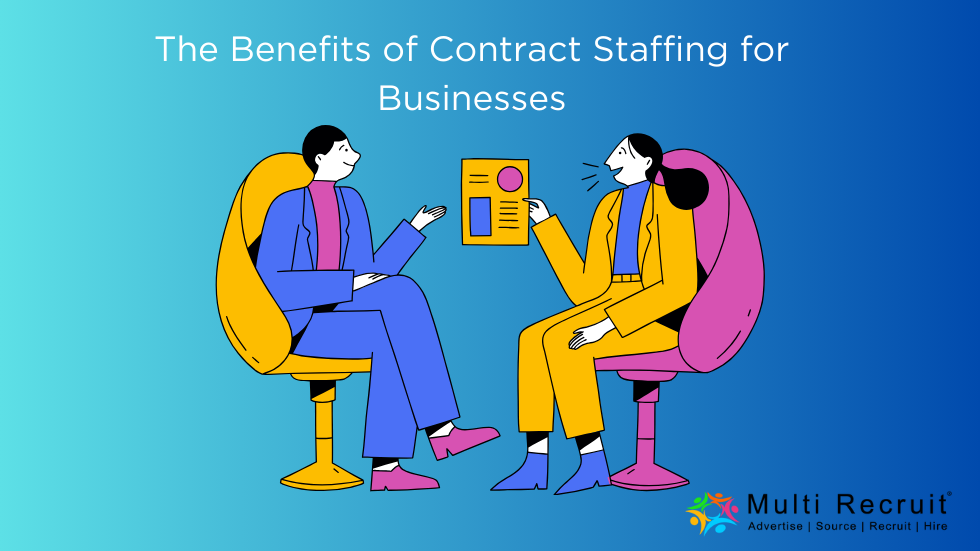In the dynamic landscape of today’s business world, agility and flexibility have become paramount for success. One strategic approach that many businesses are adopting to meet their workforce needs is contract staffing. This model of employment, where professionals are hired for a specific project or time duration, offers a range of advantages that can positively impact the efficiency and effectiveness of a business. In this blog, we will explore the benefits of contract staffing and how it can contribute to the growth and adaptability of businesses.
What are the benefits of Contract Staffing for Businesses?
1. Agility in Scaling Teams:
One of the primary benefits of contract staffing is the agility it provides in scaling teams based on project requirements. Businesses often face fluctuations in workload, and hiring full-time employees for short-term projects might not be the most cost-effective solution. Contract staffing allows organizations to quickly assemble skilled teams for specific tasks and then scale down once the project is completed.
2. Access to Specialized Skills:
Contract staffing enables businesses to tap into a pool of specialized skills that might not be available in-house. Instead of investing time and resources in training existing employees or hiring permanent staff for niche projects, businesses can bring in experts with the required skill set for the duration needed. This not only ensures quality outcomes but also accelerates project timelines.
3. Cost Efficiency:
Contract staffing can be a more cost-efficient solution for businesses, especially for short-term projects. By hiring contractors, organizations can avoid the long-term financial commitments associated with full-time employees, such as salaries, benefits, and training costs. This cost flexibility allows businesses to allocate resources more strategically and adapt to changing market conditions.
4. Reduced Administrative Burden:
Managing payroll, benefits, and other administrative tasks for a large workforce can be resource-intensive. Contract staffing simplifies this process as contractors are often responsible for their own taxes, benefits, and insurance. This reduction in administrative burden allows businesses to focus on core activities, improving overall operational efficiency.
5. Rapid Response to Market Changes:
In a fast-paced business environment, the ability to respond quickly to market changes is a competitive advantage. Contract staffing provides the flexibility needed to adapt to shifts in market demand, technology, or industry trends. Businesses can swiftly assemble teams with the required expertise to capitalize on emerging opportunities or navigate unforeseen challenges.
6. Risk Mitigation:
Contract staffing can be a valuable risk mitigation strategy for businesses. In industries where project timelines and scopes are subject to change, having a flexible workforce allows organizations to adapt without facing the challenges of downsizing or reorganizing full-time teams. It provides a safety net for managing uncertainties in project outcomes.
7. Enhanced Diversity and Innovation:
Contract staffing allows businesses to bring in a diverse range of talents and perspectives. Contractors, often having worked on various projects and with different organizations, can bring fresh ideas and innovative solutions to the table. This diversity can contribute to increased creativity and problem-solving within the organization.
8. Seamless Knowledge Transfer:
When businesses bring in contract staff with specialized skills, knowledge transfer becomes a natural part of the process. Full-time employees can learn from contractors, acquiring new skills and knowledge that can be retained within the organization even after the contract ends. This continuous learning fosters a culture of adaptability and growth.
Conclusion:
Contract staffing is not just a hiring model; it’s a strategic approach that empowers businesses to navigate the complexities of the modern business landscape. Whether it’s adapting to changing market demands, accessing specialized skills, or optimizing costs, the benefits of contract staffing position businesses for success in an ever-evolving environment. Embracing this flexible staffing model allows organizations to build agile, skilled, and efficient teams that can drive innovation and propel them toward their business goals. To know more connect with Multi Recruit for contract staffing services in India.
Frequently Asked Questions
Q: How does contract staffing provide agility for businesses in terms of workforce management?
Contract staffing offers businesses the flexibility to scale their workforce up or down based on project needs. This agility allows organizations to quickly assemble teams with the required skills for specific projects and then adjust their staffing levels when projects are completed, contributing to operational efficiency.
Q: What advantages does contract staffing bring in terms of accessing specialized skills?
Contract staffing enables businesses to tap into a pool of specialized skills that may not be available in-house. Instead of hiring full-time employees for short-term projects or investing in extensive training, businesses can bring in contractors with the exact expertise needed for the duration of the project, ensuring quality outcomes.
Q: How does contract staffing contribute to cost efficiency for businesses?
Contract staffing offers cost efficiency by avoiding long-term financial commitments associated with full-time employees, such as salaries, benefits, and training costs. Organizations can allocate resources strategically, paying for services only for the duration of a project. This financial flexibility enhances cost-effectiveness and adaptability.
Q: What role does contract staffing play in risk mitigation for businesses?
Contract staffing serves as a risk mitigation strategy for businesses, especially in industries where project timelines and scopes may change. Having a flexible workforce allows organizations to adapt without the challenges of downsizing or reorganizing full-time teams, providing a safety net for managing uncertainties in project outcomes.
Q: How can businesses leverage contract staffing to respond rapidly to market changes?
Contract staffing empowers businesses to respond swiftly to market changes by assembling teams with the required expertise. Whether it’s seizing emerging opportunities or navigating unforeseen challenges, contract staffing allows organizations to adapt quickly without the constraints of a fixed, long-term workforce, contributing to a competitive edge in the market.

